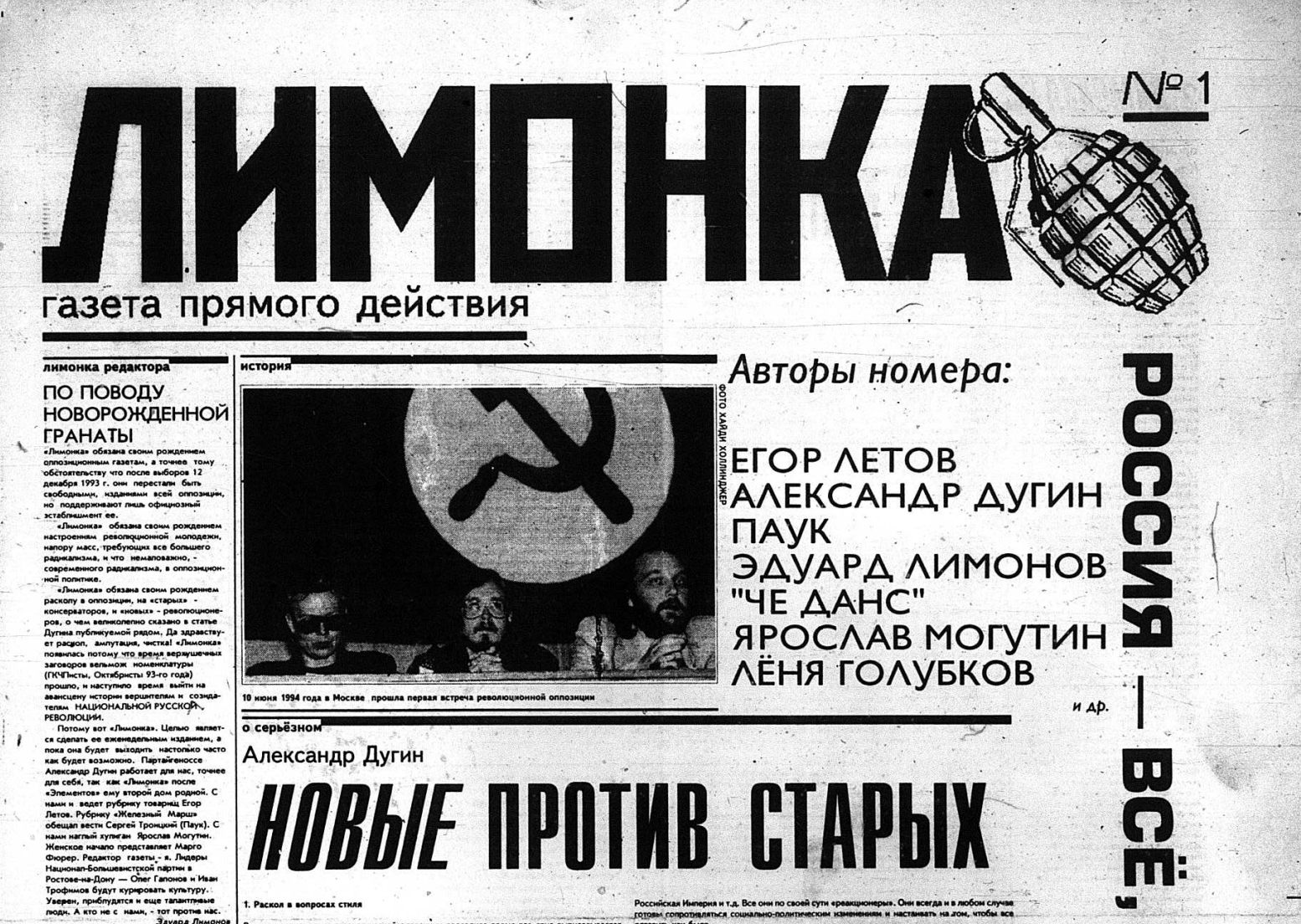Filed Under: Topic > Counterculture > A Conservative Revolutionary Avant-Garde
A Conservative Revolutionary Avant-Garde

Limonka was the official newspaper of the National Bolshevik Party (NBP), the political party-cum-countercultural movement founded in 1994 by provocative émigré writer Eduard Limonov (Savenko, 1943-2020) and the mystical artist-philosopher Alexander Dugin (1962-). An attempt to combine radical right- and left-wing culture and ideology, the party began as a response to the 1993 Constitutional Crisis. It aimed to produce a specific kind of counter-intelligentsia or counterpublic to fight Yeltsin’s radically neoliberal rule, which many segments of the Russian population saw as fundamentally repressive, and to protest the disastrous consequences of economic “shock therapy.”
At different stages of its existence, the NBP took the form of a radical political art project, an armed revolutionary organization, and—starting in the 2000s, after Dugin left, and up until the Russian annexation of Crimea—a street avant-garde of the liberal opposition against Putin. In 2005, the party was legally banned and switched its name to Drugaia Rossiia (The Other Russia), which also became the name of a broad anti-Putin coalition. At the party’s inception, Limonov and Dugin wanted to attract to its ranks what they considered the most dangerous elements of society. Accordingly, the NBP came to include an eclectic and contradictory set of people: marginals, ultranationalists, anarchists, and even radical leftists. In the words of Aleksey Tsvetkov (1975-), a key figure in the 1990s-era NBP, the party at the time was comprised of “hooligans who wanted to be poets and poets who wanted to be hooligans.”
Limonka was commonly sold in independent record stores and included articles about current politics, alternative art and music, critical theory, early Soviet culture, German Nazism and Italian fascism, 1970s terrorist groups, along with excerpts from—and discussions of—Jean Genet, Louis-Ferdinand Céline, William Burroughs, and Daniil Kharms, among other authors. In both form and substance, Limonka returned to the aesthetics and posture of the historical avant-gardes, following the principle of “the more radical, provocative, anti-bourgeois, anti-liberal, anti-capitalist, and anti-Western—the better.” Limonka—from the Russian “lemon [limon]”—is slang for “hand grenade.” The name also alludes to the party’s founder, Limonov (a pseudonym), and to the series of political broadsides he wrote for the Russian press at the time—verbal “grenades” launched at Boris Yeltsin, Vladimir Zhirinovsky, and the entirety of the Russian intelligentsia.
This issue of Limonka featured Dugin’s article-manifesto “The New Against the Old [Novye protiv starykh],” which laid out some fundamental principles of the author’s “conservative revolutionary” conception of politics. Dugin distinguishes between “the old”—those who, regardless of political affiliation (liberal, communist, fascist, conservative), want to maintain the status quo—and “the new”—who, no matter their specific views, wish to fight against it. These new rebels, whom Dugin regards as the future constituency of the NBP, are to be found among all kinds of “marginals”: disenfranchised youth, war veterans, anarchists, neo-fascists, punks, and rockers.